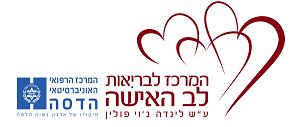Everything You Wanted to Know About Fasting on Yom Kippur
Well, okay, maybe not everything. But we will share at least ten facts and recommendations to help you fast on Yom Kippur without harming your health. We will also refute some myths, or perhaps corroborate some of them. May you have an easy, meaningful and healthy fast!a
 Does fasting help you diet?a
Does fasting help you diet?a
This may be disappointing, but fasting for 24 hours does not help with weight loss. In fact, it can even have the opposite effect. Although you will probably lose 900 grams of body weight in the first 24 hours of not eating at all, this loss consists mostly of fluids that are replenished after the fast is over. If you want to lose weight, you should adopt healthy eating habits and a healthy lifestyle throughout the entire year. And the coming year is a great opportunity to start!a
Is fasting good for heart health?a
The good news: it probably is. That is, at least for mice. The bad news: one day a year is not enough to make a difference. Rather, fasting a few days every month for many years has been shown to improve heart health. Studies on mice and rats have found that fasting diets following a variety of protocols have beneficial effects, including longer life spans and reduced risks of cardiovascular disease, diabetes, cancer and dementia. There are still not enough clinical trials or data on humans to evaluate the safety of such diets. It is likely that long-term fasting diets are beneficial due to their effect on the function of hormones, such as the growth hormone, similar to insulin, as well as to the resulting decrease in blood sugar and fats in the blood.a
Does fasting trigger labor in pregnant women?a
A study conducted in Israel has shown that there is indeed an increase in the rate of births after Yom Kippur is over. In fact, among women who fasted on Yom Kippur, there was an increase in pre-term birth rates, at less than 37 weeks gestation, compared to women who fast on Ramadan. The Yom Kippur lasts for 25 hours, almost double the length of the Ramadan fast, which takes place daily during daylight hours during the month of Ramadan. The two major contributing factors to this increase in birthrates are probably dehydration and a drop in blood sugar levels during the Yom Kippur fast.a
Are there specific recommendations for women who are pregnant or nursing?a
Of course, each woman should consult with her medical professionals. Usually, pregnant women who are generally healthy can fast if they do not have problems with dehydration or anemia. According to medical recommendations, if during the fast they feel extremely weak, dizzy or faint, or experience nausea or vomiting, they should drink immediately, preferably a sweetened liquid, at a rate of one quarter cup every few minutes until they feel better. Pregnant women classified with high-risk pregnancies should not fast, and all pregnant women are advised to stay at home in a room with air-conditioning.a
Women who are breastfeeding exclusively should not fast and should drink intermittently throughout Yom Kippur to ensure that their milk production does not drop. For women who are breastfeeding and giving their babies supplemental feedings, there is no medical restriction against fasting, but they should stay in an air-conditioned environment and avoid exerting themselves.a
What about people with chronic diseases or taking medications?a
It is usually recommended that patients suffering from serious diseases such as heart, kidney or liver disease or cancer should avoid fasting. Diabetics should consult with their doctors to determine if they can fast and, if so, with what restrictions. People who take regular medication due to other chronic diseases should not stop taking their medication unless they have received their doctor's approval to do so. If you are taking antibiotics to treat a life-threatening condition, do not stop taking them!a
Women using contraceptive pills should take one pill with the final meal prior to the fast and then another pill immediately after Yom Kippur ends.a
Does fasting cleanse the body of toxins?a
Opinions are divided, but it is important to know that no evidence has emerged from any study that fasting helps to cleanse the body of toxins or harmful substances. In fact, a 25 hour fast, or, to be more precise, not drinking during the fast can dehydrate the body. As a result, toxins released into the bloodstream are not removed from the body by the kidneys, which can lead to an accumulation of toxins in the body and a feeling of illness or weakness.a
Is it possible to “store” enough nourishment for the entire period with a large meal prior to the fast?a
Unfortunately, the answer is no. A healthy stomach empties within about four hours. However, to make fasting easier, the recommendation is to eat complex carbohydrates and whole grains before the fast because they contribute to the feeling of being sated and help maintain balanced sugar levels during the fast. For example, to contribute to a sense of fullness, you can add foods with fat content, such as avocado, tahini and olive oil, which slow down the rate at which the stomach empties. However, even these measures will not make you feel full the next day.a
Should I eat the final meal immediately before the fast starts?a
There is no medical information about this, but experience says no. Eating very quickly just before the fast leads to feelings of heaviness, stomach pressure and fatigue. It is best to eat in a leisurely fashion and take time to enjoy your food. That extra time will help you feel more sated.a
What foods or beverages should be avoided before the fast?a
Clearly, common sense dictates that you should avoid fried, salty or spicy foods because they make you thirsty and can cause heartburn and discomfort during fasting. Regarding beverages, it is recommended to reduce coffee, tea and cola intake in the hours before the fast, because they contain diuretic substances that can increase fluid loss from the body. Furthermore, regular coffee drinkers should gradually reduce the amount of coffee they drink in the days before the fast to reduce the chance of suffering from headaches during the fast due to caffeine withdrawal.a
The fast is over. Time to gorge?a
Definitely not! Experience teaches that a heavy or rushed meal immediately after the fast can lead to feelings of heaviness, discomfort and even vomiting and nausea. After the fast is over, the recommendation is to drink and eat lightly and slowly, with breaks in the meal. People who suffer from high blood pressure or heart disease should be careful not to eat too much salt.
Sources:a
Am J Clin Nutr. 2007 Jul;86(1):7-13.
“Alternate-day fasting and chronic disease prevention: a review of human and animal trials.”
Varady, K.A.,1 Hellerstein, M.K.
https://www.ncbi.nlm.nih.gov/pubmed/17616757
“Fasting Recommendations for Diabetics” (in Hebrew):
Prof. Naim Sheheda, Dr. Riad Machamid, Dr. Avivit Cohen and Rabbi Moshe Cohen
http://www.themedical.co.il/Article.aspx?f=12&s=2&id=3486
“Fasting on Yom Kippur: Medical Aspects” (in Hebrew)
Dr. Ram Dikman
חיפוש
פוסטים אחרונים
Inspirational advice for women about heart disease in honor of International Women's Day
Excerpts from Onlife Magazine March 8 2022 Heal...The Pollin Food Literacy Initiative: Innovative, Creative, Empowering
The Pollin Food Literacy initiative aims to imp...It's Not Just Calcium
It’s not just calcium that calcifies the valve....Waterpipe (Nargila) Smoking – Myth vs. Reality article and picture
They say that it’s a harmless hobby – les...Gender Equity in Medical Research article and picture
For years we have complained that there aren’t ...

שלום לכם ,
. רציתי להזמין אתכם להרצאה על יהדות בחינם
? גם בארצות הברית וגם בארץ יכל לעניין אתכם להגיע
: המייל שלי
Shimonsharkazi@chef.net
.מצפה לשמוע מכם תודה רבה